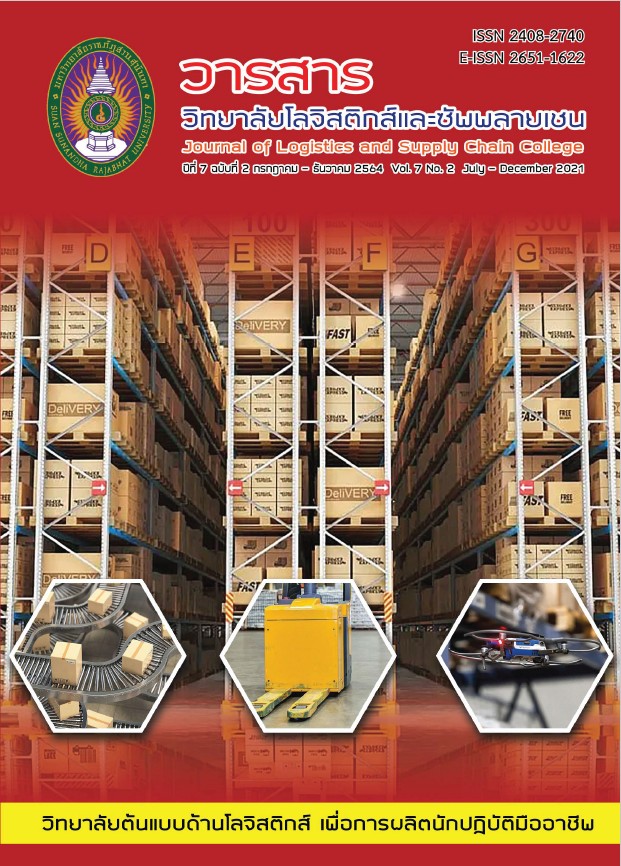A Study of Factors Affecting the Efficiency of Duty Refunds under Section 29 of the Customs Act, B.E. 2560 (2017)
Keywords:
Duty Refunds, Recognition, Job FeaturesAbstract
The objective of this research was to study factors affecting the efficiency of the duty refunds under Section 29 of the Customs Act, B.E. 2560 (2017). The factors were categorized into three main groups, namely, personal factors, knowledge factors about import duty refunds, and task feature factors. The research instrument was the questionnaires distributed to respondents with a sample size of 170. The t-test, ANOVA and multiple regression analysis were used to perform all statistical tests. The results showed that the personal factors, including gender, age, marriage status, education level, monthly income level, work position, experience, field of business, type of organization, and business running period, affected to the efficiency of the duty refunds under Section 29 of the Customs Act, B.E. 2560 (with a statistical significance level of 0.01). The knowledge factor and task feature factors, including job variety, job importance, and job feedback, also had significantly affected to the efficiency of the duty refunds with a significance level of 0.01.
References
กรมศุลกากร. (2561). การคืนอากรตามมาตรา 29 แห่งพระราชบัญญัติศุลกากร พ.ศ. 2560. ค้นเมื่อ 23 เมษายน 2564, จาก: https://www.customs.go.th.
จิรศักดิ์ รอดจันทร์. (2556). ข้อดีและข้อเสียของความร่วมมือทางกฎหมายภาษีของประเทศไทยกับประเทศอื่น ๆ ในภูมิภาคเอเชีย: ศึกษากรณีการลดภาษีศุลกากรตามข้อตกลงเขตการค้าเสรีอาเซียนต่อการคลังสินค้า. กรุงเทพฯ: มหาวิทยาลัยกรุงเทพธุรกิจบัณฑิตย์.
ชนิดา มาเผือก. (2557). การประยุกต์ใช้สายธารแห่งคุณค่าเพื่อปรับปรุงกระบวนการทำงานที่เกี่ยวข้องกับพิธีการศุลกากร การนำเข้า-ส่งออกในเขตปลอดอากร. วิทยานิพนธ์ปริญญาวิทยาศาสตรมหาบัณฑิต, สาขาโลจิสติกส์ มหาวิทยาลัยบูรพา.
วราพร เปรมพาณิชย์นุกูล. (2561). ผลกระทบของความรอบรู้ในการวางแผนภาษีที่มีต่อประสิทธิภาพการวางแผนภาษีของผู้บริหารฝ่ายบัญชีธุรกิจ SMEs ในประเทศไทย. วารสารวิทยาการจัดการสมัยใหม่, 11(1), 106-123.
วราพร พุทธรักษา. (2559). ปัจจัยที่มีผลต่อการตัดสินใจเลือกใช้บริการตัวแทนการเดินพิธีการศุลกากรของผู้ส่งออกสินค้าอุตสาหกรรมรถยนต์สาหรับการส่งออกทางทะเล. ปริญญาวิทยาศาสตรมหาบัณฑิต, สาขาการจัดการโลจิสติกส์และซัพพลายเชน มหาวิทยาลัยเทคโนโลยีพระจอมเกล้าธนบุรี.
นิติพล ภูตะโชติ. (2556). พฤติกรรมองค์การ. กรุงเทพฯ: วี. พริ้นท์ (1991).
ดารา ทีปะปาล และธนวัฒน์ ทีปะปาล. (2553). การสื่อสารการตลาด. กรุงเทพฯ: อมรการพิมพ์.
ติน ปรัชญพฤทธิ์. (2555). การบริหารการพัฒนา ความหมาย เนื้อหา แนวทางและปัญหา. กรุงเทพมหานคร: สานักพิมพ์แห่งจุฬาลงกรณ์มหาวิทยาลัย.
พระมหาคณาธิป จันทร์สง่า. (2561). ปัจจัยที่ส่งผลต่อประสิทธิภาพการปฏิบัติงานของข้าราชการสานักงานเขตสัมพันธวงศ์ กรุงเทพมหานคร. ปริญญารัฐประศาสนศาสตรมหาบัณฑิต, สาขารัฐประศาสนศาสตร, มหาวิทยาลัยสยาม.
พัชรี บุตรคุ้ม. (2560). ปัญหาและอุปสรรคในการดาเนินงานตามโครงการผู้ประกอบการระดับมาตรฐานเออีโอ ของผู้นำเข้า ผู้ส่งออกในประเทสไทย. ปริญญาบริหารธุรกิจมหาบัณฑิต, สาขาบริหารธุรกิจ วิทยาลัยพาณิชยศาสตร์ มหาวิทยาลัยบูรพา.
ลาวรรณ เดียดขุนทด. (2561). การศึกษาบทบาทของลักษณะงานต่อความพึงพอใจในงาน กรณีศึกษา เจ้าหน้าที่กรมศุลกากร เขตคลองเตย กรุงเทพมหานคร. ปริญญาบริหารธุรกิจมหาบัณฑิต, สาขาการบริหารธุรกิจ มหาวิทยาลัยรามคำแหง.
Belch, G.E., & Belch, M.A. (2005). Advertising and Promotion: An Integrated Marketing Communications Perspective (6th ed). Boston: McGraw-Hill.
Bryan, A. G. (2009). Black's Law Dictionary. Boston: West.
Frankel, J. A., & Romer, D. (1999). Does Trade Cause Growth?. The American Economic Review, 89(3), 379-399.
Goldstein, D. M. (2010). Security and the culture expert: dilemmas of and engaged anthropology. Political and Legal Anthropology Review, 33(S1), 126-142.
Hackman, J. R., & Oldham, G. R. (1980). Work re-design. MA: Addison Wesley.
Kahnamoui, F. (2013). Do Trade Restrictions or Openness Affect Economic Growth Differently in the Presence of Export Credits? Business and Economics Journal, 2013(bej-69), 1-11.
Morgeson, F. P., Medsker, G. J., & Campion, M. A. (2006). Job and team design. In G. Salvendy (Ed.) Handbook of Human Factors and Ergonomic. New Jersey: John Wiley and Sons.
Schiffiman, L., & Kanuk, L. L. (2010). Consumer Behavior, Global Tenth Edition. New Jersey: Pearson Education.
Simon, H. A. (1960). Administration Behavior. New York: The Mcmillan.
Stephen, P. R., & Coulter, M. (2553). การจัดการและพฤติกรรมองค์การ. แปลโดย วิรัช สงวนวงศ์วาน. กรุงเทพฯ: มหาวิทยาลัยรามคาแหง.
Thomas, M. C. (1876). The Law of Local Assessments. Chicago: Gallaghan and Company.
Yamane, T. (1973). Statistics: An Introductory Analysis. New York: Harper and Row Publications.



